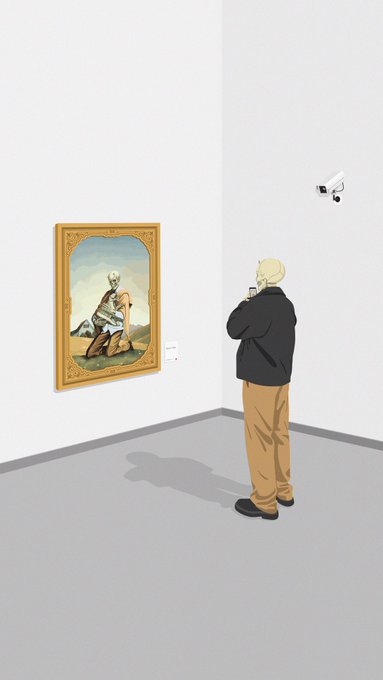VANITYのTwitterイラスト検索結果。 1,630 件中 8ページ目
A stunning #commission from @bibziebun of Vanity and Roxxi making some noise as good bandmates do
#HelluvaBossOC #HazbinHotelOC #furryart #digitalart #OC
Example-
Paulina and Sam from Danny Phantom are both feminine. Both of them wear makeup and crop tops and Sam even wears a skirt. The only difference is Paulina likes bright colors/takes pride in her looks and Sam likes dark colors and considers herself above vanity.
Mr Egerton Castle, by Leslie Ward - Vanity Fair, 9 March 1905
He was an author, antiquarian, and swordsman, and an early practitioner of reconstructed historical fencing, frequently in collaboration with his colleague Captain Alfred Hutton.
Sold! ✨
Vanity, my entry into @terrelldom’s #Born2DieContest, has been collected by @NFTsVirtuoso for 0.60 eth
Thank you so much!
@Foundation // https://t.co/SszR8ViKJ4
Mr Lewis Waller, by Julius Mendes Price - Vanity Fair, 13 October 1904
William Waller Lewis, known on stage as Lewis Waller, was an English actor and theatre manager, well known on the London stage and in the English provinces.
The Hon SG Holland, by Leslie Ward - Vanity Fair, 25 August 1904
He was a British barrister and peer. He succeeded his father as Viscount Knutsford in 1914.
Charles Hemphill, by Leslie Ward - Vanity Fair, 11 August 1904
Charles Hare Hemphill was an Irish politician and barrister. He had no son and on his death, the title passed to his brother Fitzroy Hemphill, 3rd Baron Hemphill.
Pelham Warner, by Leslie Ward - Vanity Fair, 3 September 1903
Affectionately and better known as Plum Warner or "the Grand Old Man" of English cricket, he was a Test cricketer and cricket administrator. He was knighted for services to sport in the 1937 Coronation Honours.
RG Broadwood, by Leslie Ward - Vanity Fair, 27 August 1903
Lieutenant General Robert George Broadwood was Commander of British Troops in South China and also served in the Boer War where played a large role in the Battle of Driefontein.
Charles Henry John Chetwynd-Talbot, by Leslie Ward - Vanity Fair, 30 July 1903
He was a British peer. Unusually for a wealthy nobleman of the period, he began several businesses connected with road transport, with mixed success.
When the energy is not misused by arrogance, conflict, violence, vanity, then it will start to apprehend the true source of its being, it will rise up to illuminate the sun itself. Celebrating the union of pure Energy with pure Love.❄️🤍
All dream, but not equally. Those who dream by night in the dusty recesses of their minds, wake in the day to find that it was vanity: but the dreamers of the day are dangerous, for they may act on their dreams with open eyes, to make them possible. ~T. E. Lawrence
#aiart
This piece is featured on @Flickr 11/28/2022 "Explore" #gallery 😅
I AM WEARY
For details=> https://t.co/1YOXPQcXrF
Go and take a peek on exquisite collection of #art and photography 😉
#Vanity project #hands #SelfPortrait #charcoal #drawing
#ArtIsMyTherapy
Sir Edmund Barton, by Leslie Ward - Vanity Fair, 16 October 1902
He as an Australian politician and judge who served as the first prime minister of Australia 1901-03, holding office as the leader of the Protectionist Party.
Whitelaw Reid, by Leslie Ward - Vanity Fair, 25 September 1902
He was an American politician and newspaper editor, as well as the author of Ohio in the War, a popular work of history. He died while serving as the ambassador to Britain on December 15, 1912.
Theodore Roosevelt, by James Montgomery Flagg - Vanity Fair, 4 September 1902
He was an American politician, statesman, soldier, conservationist, naturalist, historian, and writer who served as the 26th president of the United States from 1901 to 1909.
Admiral Sir Archibald Lucius Douglas, by Leslie Ward - Vanity Fair, 3 July 1902
He was a Royal Navy officer. He is credited with having introduced the sport of football to Japanese naval cadets.
Charles Santley, by Leslie Ward - Vanity Fair, 27 February 1902
He was an English opera and oratorio singer with a bravura technique who became the most eminent English baritone and male concert singer of the Victorian era.
Francis Warre Warre-Cornish, by Leslie Ward - Vanity Fair, 26 September 1901
He was a British schoolmaster, scholar and writer. He married Blanche Ritchie, who was celebrated for her conversational powers and eccentricities.
Thomas Kelly-Kenny, by Leslie Ward - Vanity Fair, 29 August 1901
A British Army general who served in the Second Boer War. He died at Hove on 26 December 1914. He is buried in Hove Cemetery having left strict instructions in his will that he did not want a military funeral.




























